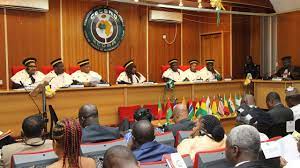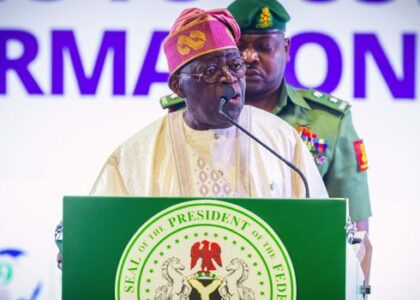The Facts of the Case
The first Applicant, Algom Resources Limited, a limited liability company incorporated under the laws of Sierra Leone on 7 June, 2016, accused officials of the government of the Republic of Sierra Leone of engaging in malpractice that cost the company its gold mining licence and significant amount in investment. The case of company was that it was granted a four year gold exploration licence from 9th January, 2017, over the Baomahun exploration area and that it spent the sum of 4.8 million US dollars to explore area and discover gold in commercial quantities.
In order to obtain a large-scale mining license from the government of Sierra Leone, the company said it needed an Environmental Impact Assessment (EIA) License which it expected to obtain from the Environment Protection Agency, Sierra Leone (EPA-SL). It claimed that the Agency gave a negative recommendation on the grounds that the project was located within a protected forest reserve and needed clearance from a different agency, the National Protected Area Authority (NPAA), and that the company was unable to secure the EIA due to numerous alleged fraudulent administrative hindrances.
The first Applicant later applied for a new large-scale mining license on 25 February 2021 but was surprised that a notification was published in a Gazette informing the public that a company named FG Gold Limited had obtained an Environment Social and Health Impact Assessment Report over the same Baomahun Concession.
The case of the first Applicant was therefore that, by virtue of Section 108(4) of the Mines and Minerals Act, the Respondent State ought to have given it the opportunity to make proposals that will resolve the grounds for the refusal. But the Applicant contended that the purpose of that Section is to give applicants of large-scale mining licenses the opportunity to remedy defective or incomplete applications before a final decision is made on the application. The 1st applicant further stated that it made several enquiries without response about FG Gold, more particularly, to ascertain the reasons why FG Gold’s application took precedence over its own application and described the government’s decision as arbitrary and a willful disregard of due process of law.
It was in evidence that the 1st Applicant’s equipment were removed from the site by the respondent upon expiry of its licence, but the defendant challenged the applicants to cite any provision that prevented the removal of its equipment and said that, by the government’s letter dated 25 March, 2021, which was acknowledged by the 1st applicant, that the Director of Geological Survey reminded the first Applicant of their statutory obligations to vacate the licensed area.
On the basis of the failure of the 1st applicant to obtain the requisite licence, the 2nd applicant contended that the Respondent rendered her property useless, and her investments worthless. She described the decision as a violation of her right as well as those of the company’s employees as it not only subjected them to embarrassment and financial difficulties, but also the possibility of many of the workers not being able to fend for their families and dependents, therefore infringing on their right to health, both physical and mental.
Together, the Applicants claimed USD 50,000,000 in exemplary damages, another USD 20,000,000 as damages for anxiety and embarrassment and USD 500,000 as costs.
The Respondent denied all the allegations, claiming that the Exploration License of the 1st applicant expired in 2021. Ipso facto, that all their mining rights in Sierra Leone were extinguished. It also contended that the company’s application for a large-scale mining licence made in February, 2021, was treated fairly and denied that the government favoured FG Gold over the 1st applicant, Algom Resources.
The respondent’s answer to the claims of the 2nd Applicant, was that it had no direct dealing with her, arguing that the damage suffered by the company and its shareholder did not mean that both are entitled to compensation as “although two separate entities may have suffered from the same wrong, it is only one entity whose rights have been infringed”. The Respondent contended that the applicants decided to bring in the shareholder as a party in order to satisfy the threshold for human rights violation.
The Respondent therefore urged the Court to dismiss the case as there were no violations of a recognised right established by law. It also prayed the Court for an order to dismiss the 2nd Applicant’s locus standi as a party to the action. The Respondent also asked for 100,000 US dollars as costs.
The Court’s Finding of Facts
In its analysis, the court came to the following finding of facts:
- That the cumulative effects of the actions and decisions of the respondent’s agencies significantly frustrated the 1st applicant;
- The EPA-SL’s assessment or review of the 1st Applicants EIA License application after the Environment, Social and Health Impact Assessment (ESHIA) Report was submitted prejudiced and delayed the mining licence;
- The manner the 1st respondent’s licence application was handled stand in significant contrast to how that of its competitor, FG Gold was handled;
Decisions
The court came to the decisions that:
- the existence of a fundamental right to fair treatment and security under customary international law was not proved and so the court dismissed it.
- the respondent violated the 1st applicant’s right to property regarding the removal and destruction of its mining equipment and installations. Also, that the respondent violated the 1st applicant’s legitimate expectation of acquiring rights to the concession or property.
- The respondent did not violate the 2nd applicant’s right to security and protection of the law; did not violate her property rights; did not violate her employment right; and did not violate her right to development.
Reparation
The court refused to order the Respondent State to the reverse of the award of the mining lease to FG Gold and award it in favour of the Applicants. Rather, the court awarded compensation to the tune of $200, 000. 00 for the violation of the 1st applicant’s right to property
Analysis
The main point we would like to consider in this analysis is the jurisdictional question raised relating to the applicants. On the face of it, the right of the 2nd applicant to approach the court to ventilate human rights grievances is settled except that in this case her claims were secondary and derived from injuries sustained by the 1st applicant. As a result, her claim was bound to be infested by whatever jurisdictional deficiency affected the 1st applicant.
Without commenting on the decisions relating to the 1st applicant at this point, it is important to observe that the rejection of what appears to have been the opportunistic claims of the 2nd applicant is in order and unassailable, except that the court did not have the opportunity to access her rights as a shareholder under the municipal law of Sierra Leone. The gap would perhaps have been taken care of had the attention of the court been drawn to the most relevant decision of the International Court of Justice (ICJ) on the point, since the court amply relied on ICJ decisions in its judgment.
The case is Ahmadou Sadio Diallo (Republic of Guinea v. Democratic Republic of the Congo), Merits, Judgment, ICJ Reports, 2010, p. 63. The claim of Guinea on behalf of Ahmadou Sadio Diallo in the case was that Diallo, a businessman of Guinean nationality, was unjustly imprisoned by the authorities of the Democratic Republic of the Congo (DRC), after being resident in that State for thirty-two (32) years, despoiled of his sizable investments, businesses, movable and immovable property and bank accounts, and then expelled. Guinea was espousing his claim for human rights violations and also seeking to claim for the wrongs done to his company, which was registered in DRC and was therefore subject to the laws of DRC.
Without allowing the facts to delay us further, we shall immediately highlight the parts of the judgments that are relevant to the 2nd Applicant’s claim before the ECOWAS Court. The starting point for the ICJ was a reference to the law of DRC by observing that:
“[I]nternational law has repeatedly acknowledged the principle of domestic law that a company has a legal personality distinct from that of its shareholders…. Therefore, the rights and assets of a company must be distinguished from the rights and assets of an associé [share holder]. In this respect, it is legally untenable to consider, as Guinea argues, that the property of the corporation merges with the property of the shareholder. Furthermore, it must be recognized that the liabilities of the company are not the liabilities of the shareholder.” Paragraphs 155-156
Furthermore, the court reiterated its salient observation in the Barcelona Traction, Light and Power Company, Limited (Belgium v. Spain), Second Phase, Judgment, ICJ Rep 1970, p. 35, para. 44), where it recognised that though “a wrong done to the company frequently causes prejudice to its shareholders”, a damage affecting both company and shareholder will not mean that both are entitled to claim compensation. This is on the basis that “whenever a shareholder’s interests are harmed by an act done to the company, it is to the latter that he must look to institute appropriate action; for although two separate entities may have suffered from the same wrong, it is only one entity whose rights have been infringed” (p. 35, para. 44). This is the clear result of the court’s acknowledgment of a “distinction between injury in respect of a right and injury to a simple interest … so that an act directed against and infringing only the company’s rights does not involve responsibility towards the shareholders, even if their interests are affected.” (p. 36, para. 46.)
A clear acceptance of this position is evident in the decision of ECOWAS Court in the case under review, as seen in the refusal of the court, and rightly too, to hold that the 2nd applicant was entitled to compensation based on injury held to have been suffered (violation of property right) by the 1st applicant. The court’s decision on that point is sound in law and therefore incontrovertible.
The missing link however, as earlier observed, was the absence on the face of it of a reference to the law of Liberia to determine whether there was any right appertaining to the 2nd applicant (as a shareholder) that could have been violated by the wrong done to the 1st applicant. This cannot be wholly attributed to the inadvertence of the court, given that the lawyers for the Applicants appear not to have brought any such rights to the fore.
In Diallo’s case, for instance, because it was claimed on his behalf that by reason of the wrong done to his company, his direct right as associé to take part and vote in general meetings of the companies; his property right; his right to be appointed or to remain gérant; and his right to oversee and monitor the management of the company, were violated. The court had to examine the company law of the DRC to determine the rights shareholders enjoy in companies in the DRC. Such is a needed exercise in claims of this nature, as international law has not got its own rules on it and as a consequence relies wholly on the municipal law of incorporation of the company. As explained in details in the Barcelona Traction case:
“In this field international law is called upon to recognize institutions of municipal law that have an important and extensive role in the international field . . . All it means is that international law has had to recognize the corporate entity as an institution created by States in a domain essentially within their domestic jurisdiction. This in turn requires that, whenever legal issues arise concerning the rights of States with regard to the treatment of companies and shareholders, as to which rights international law has not established its own rules, it has to refer to the relevant rules of municipal law.” (pp. 33- 34, para. 38.)
It was for the satisfaction of the rule that the court examined several provisions of the Congolese Decree of 27 February 1887 on Commercial Corporations, being the State of incorporation of the companies. The ECOWAS court thus missed the opportunity to explore the rights of the 2nd Applicant, as a shareholder under Liberian law.
Regarding the 1st applicant, the potent question that must stand out is whether, being an artificial person, the 1st applicant had the appropriate status to invoke the essentially human rights jurisdiction of the court. This question falls within the ambit of articles 10(c) and 10(d) of 1991 Protocol of the Court as amended by the Supplementary Protocol 2005.
Article 10(c) stipulates that access to the court is open to “individuals and corporate bodies in proceedings for the determination of an act or inaction of a community official which violates the rights of the individuals or corporate bodies.” And article 10(d) stipulates that access is open to “individuals on application for relief for violation of their human rights….” These provisions had been variously construed in previous cases, except that article 10(d) has had a reputation for divergent decisions.
As for article 10(c), the settled view of the court is that: “[t]t follows from article 10(c) above that the proper party should either be an individual or a corporate body bringing an action against a Community Official for an act or omission which violates their rights”. And that the article is relevant only to suits brought against Community officials, to the exclusion of member States, which are not officers of the Community. In simple terms, article 10(d) cannot be relied upon by a corporate entity as a jurisdictional base against a member State. See ECW/CCJ/JUD/ 03/19: Dexter Oil Limited v. Republic of Liberia.
As for article 10 (d), the jurisprudential variation arises from the use of tout personne victime” (meaning, “every person that is a victim”) in the French Text, as against the use of individuals (natural persons), in the English text.
In support of the view that article 10(d) grounds the competence of both human beings and corporations, the court in The National Co-Ordinating Group of Departmental Representatives of the Cocoa-Coffee Sector (CNDD) v. Republic of Cote D’ivoire, (2004 – 2009) CCJELR, affirmed the right under article 10(d) of both natural and legal persons endowed, within the framework of their national laws, with the required legal capacity to seise the court.
It is unclear whether by granting companies access, the court was also affirming their competence to be respondents before the court. If that was the base, the decision would obviously not sit well with its subsequent decision in SERAP v. President of Federal Republic of Nigeria (2010) CCJELR, which excluded corporate bodies from being cited as defendants before the court.
A more direct conflict was however presented in Stacrest Investment Ltd v. President ECOWAS Commission, (2011) CCJELR, 165, where the court clearly stated that “it is equally true that no corporate body can bring a human rights case before this Court and that the provisions of the African Charter on Human and Peoples Rights do not avail the Plaintiff (a corporate body) in this court in so far as they complain about human rights abuse against them as a Company.” The court consolidated and further clarified this its position in Ocean King Nig. Ltd v. Republic of Senegal, (2011) CCJELR 139, where it declared that the word “individuals” in article 10(d) refers only to “human beings and no more”. The court however admitted that a company can have access to the court on specific human rights related complaints and on that occasion the court was prepared o hear the corporate body’s complaint of lack of fair hearing.
It was these divergent opinions that the court took it upon itself to resolve in Dexter v. Liberia, where it took the initiative, and rightly too, to invoke its inherent jurisdiction to depart from all of its previous decisions that were based on the broad interpretation of French text to grant access to corporations for human rights litigation under article 10(d). It thus reasoned:
“Whereas, according to the court, the English text of article 10(d) clearly states individuals (natural persons), the French texts of the same Article states tout personne victime” (every person that is a victim). Personne in the French text includes an individual who is a physical person and a corporate body which is a juristic person. The key word however is that the personne must be a victim of human rights violation. It is the opinion of this Court that, if Article 10 (c) (English and French Texts) categorically includes both individual and corporate bodies, same would have been repeated in 10(d) if that was the intention of the drafters of the law. The Court therefore affirms that it is not the intention of the statute to accommodate corporate legal person in Article 10(d) of both versions of the text”.
In agreement with the decision of the court to affirm the English text, we think the court already provided an answer to the phrase “every person that is a victim” in the French text in the Incorporated Trustees of The Miyetti Allah Kautal Hore Socio-Cultural Association v. Federal Republic Of Nigeria, (2012) CCJELR, 171. Here the court took the firm view, following Nosa Ehanire & 3 Ors v. Federal Republic of Nigeria, (2017) CCJELR, that the cardinal rule on access to the Court is that only direct victims of human rights violations can access the court for relief for the violation of their human rights, as per article 10(d) of the Supplementary Protocol of 2005. And that in essence, only “direct victims alleging violation of their rights with interest that is direct, personal and certain are the parties inherently qualified to seek remedy for such violation which ordinarily cannot be transferable to another individual or organisations”. It is our considered view that this was the context in which the French text was framed.
However, the court declared that it was nonetheless not unmindful of its jurisprudence and that of other international courts creating exceptions and granting corporate bodies access to court for violation of their fundamental rights against a member State. And drawing from Ocean King Nigeria Limited v. Republic of Senegal ECW/CCJ/JUD/07/11, the court affirmed that “[t]he right to fair hearing is not dependent on human rights and the Defendant owes an obligation to every ECOWAS citizen or entity to ensure fair hearing within its territory, failing which this Court will have the right to entertain an application by an aggrieved party even if it is based on the Court’s inherent jurisdiction.”
The confusing part for us is the distinction that the court found to exist between human rights and “fundamental” corporate rights. According to the court:
“Human rights imply the rights that belong to all human beings irrespective of their nationality, race, caste, creed and gender amongst others; like right to life, right to health and right against torture, inhuman and degrading treatment which are specific to a human being. On the other hand right of a corporate body, are rights that are fundamental and necessary for the existence of a corporate body which a legal entity can enjoy and be deprived of; for example right to freedom of speech as the corporation is entitled to speak about its product; right to property as the corporation generates profit in shares and, or cash and is entitled to the quiet enjoyment of same. The established exceptions under which corporate bodies can ground an action are; rights that are fundamental rights not dependant on human rights and they include right to fair hearing, right to property and right to freedom of expression.”
An appraisal of the recognition by the court that these exceptions qualify a corporation to access its essentially human rights jurisdiction requires an examination of the jurisdictional bases of the court. The question that thus begs for answer is under what provision of the court’s Protocol is this exceptional competence of corporations based? The importance of this question lies in the fact that by the court’s own showing, neither article 10(c) nor (d) grounds the competence of the court. Can the jurisdictional base the court is assuming come under its inherent or implied jurisdiction as the court hinted in Ocean King? It is in our view very doubtful if it is legally tenable for the court to expand its very restrictive jurisdiction in human rights matters outside the clear authority of its Protocol by way of its inherent or implied jurisdiction.
The reliance on decision of the European Court of Human Rights is not also very helpful, given the obvious differences between the jurisdictional provision of that court and that of the ECOWAS Court. It is difficult not to see that, as against the ECOWAS court’s article 10(d), which expressly limits human rights litigation to individuals, article 32 of Protocol 11 to the Convention for the Protection of Human Rights and Fundamental Freedoms, extended the court’s jurisdiction to all matters concerning the interpretation and application of the Convention and the protocols thereto. This was followed by article 34, which provides that “[t]he Court may receive applications from any person, non-governmental organisation or group of individuals claiming to be the victim of a violation by one of the High Contracting Parties of the rights set forth in the Convention or the protocols thereto. The High Contracting Parties undertake not to hinder in any way the effective exercise of this right”.
Thus while the Protocol 11 allows for the litigation of all claims set forth in the Convention, the operative word in article 10(d) – individuals – is very restrictive and specific, to the exclusion of the rights of corporations, as the court has rightly affirmed. the provision further restricted claims under it to human rights claims, so that whatever is not human rights, whether brought by individuals or corporations, would fail the jurisdictional threshold test prescribed by the provisions. This specificity of article 10(d) has indeed been the reason why the court has been justified in those cases where it refused to hear non-human rights cases at the suit of individuals. See Kemi Pinheiro v The Republic of Ghana, Suit No: Judgement No. ECW/CCJ/JUD/11/12 and Chude Mba v. Republic of Ghana, ECW/CCJ/JUD/30/18
Conclusion
To be absolutely clear, we take no issues with, and are not at the moment concerned about, whether corporations have a right to fair hearing or the right to property or freedom of speech, our concern here is the title of jurisdiction under which the ECOWAS court hears such claims at the suit of corporations.
It is our considered view that the court should re-examine the competence of corporations before it when next it has the opportunity. In our considered and respectful view, the reasoning of the court on the point right now is confusing, if not outrightly conflicting: the court cannot be heard to say in one breath that corporations cannot proceed against a State in human rights matters under article 10(c) and (d); and in another breath, hold that corporations could litigate certain exceptional rights before the court. Since this exception does not locate within article 10(c) and (d), we are entitled to call upon the court to re-examine its position and provide appropriate clarity. Otherwise, it should invoke its inherent jurisdiction to also overrule this aspect of the controversy and exclude corporations from its human rights jurisdiction once and for all.
We do believe it will be in the best interest of the court and of the individuals who are by law entitled to appear before the court, for the court to avoid creating another line of tension with member States. In any event, the Protocol of the court extends optional jurisdiction to corporations in its article 9(6) of its Protocol. Corporations should take advantage of that provision by negotiating same into their agreements with member States.
©Centre for Community Law, October 29, 2023







